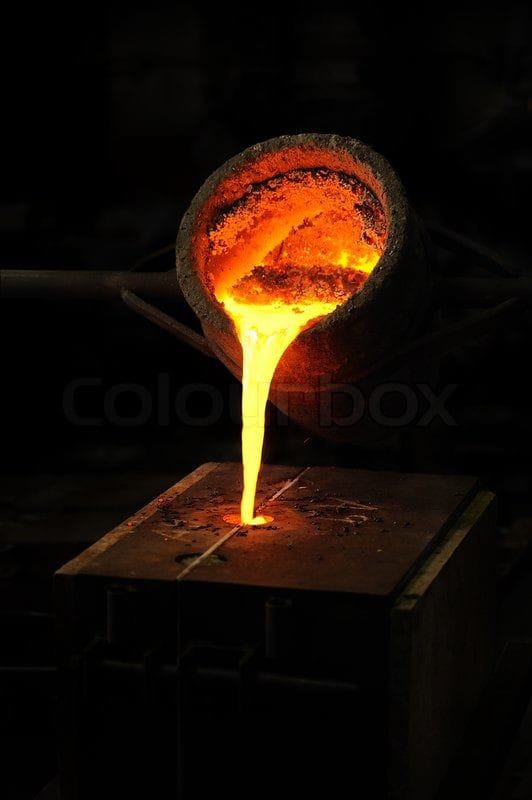
Metallurgy is the branch of science and technology concerned with the properties of metals and their production, purification, and utilization. It involves the extraction of metals from their ores, the processing of metals to obtain usable materials, and the study of the physical and chemical behavior of metallic elements.
Here are key aspects related to metallurgy:
- Mineral Processing: Involves extracting metals from their ores through processes like crushing, grinding, and concentration. This step is crucial for obtaining the raw materials needed for further metallurgical processes.
- Smelting: The process of extracting metal from its ore by heating the ore in the presence of a reducing agent, such as carbon. This results in the formation of molten metal and slag.
- Alloying: Combining two or more metallic elements to create alloys with improved properties. Common alloys include steel (iron and carbon) and bronze (copper and tin).
- Heat Treatment: A process where metals and alloys are subjected to controlled heating and cooling to alter their properties, such as hardness, strength, and ductility.
- Casting: The shaping of metals by pouring molten metal into a mold, allowing it to solidify into the desired form. Casting is widely used in the production of various metal components.
- Metal Forming: Processes like forging, rolling, and extrusion that shape metals into specific shapes and sizes without melting them.
- Corrosion and Protection: Study of how metals deteriorate in the presence of environmental factors, and methods to protect them, such as coatings, galvanization, and corrosion-resistant alloys.
- Extractive Metallurgy: Focuses on obtaining metals from their ores and refining them to achieve high purity. This includes hydrometallurgy and pyrometallurgy techniques.
- Physical Metallurgy: Investigates the physical and mechanical properties of metals and alloys, as well as the effects of various treatments on their behavior.
- Metallurgical Analysis: Involves techniques like spectroscopy and microscopy to analyze the composition and structure of metals and alloys.
Metallurgy plays a crucial role in various industries, including manufacturing, construction, aerospace, and electronics, contributing to the development of materials with specific properties for diverse applications.
Metallurgy role in various types of industries:
Metallurgy plays a vital role in various industries by providing essential materials and contributing to the development of advanced technologies. Here’s a brief overview:
- Automotive Industry: Metallurgy is integral for manufacturing vehicle components, such as engine parts, chassis, and body structures. Lightweight and high-strength alloys enhance fuel efficiency and safety.
- Aerospace Industry: Metallurgy is crucial for producing lightweight yet durable materials for aircraft components. Titanium, aluminum, and advanced alloys are commonly used in aerospace applications.
- Construction: Metallurgical materials, including steel and aluminum, are fundamental for constructing buildings, bridges, and infrastructure. Their strength and durability ensure the structural integrity of various constructions.
- Electronics: Metallurgy contributes to the production of electronic components like semiconductors, connectors, and conductive materials. Advanced alloys are essential for ensuring electrical conductivity and reliability.
- Energy Sector: Metallurgy is involved in the manufacturing of components for power generation and transmission systems. Alloys resistant to high temperatures and corrosion are critical in energy production.
- Medical Devices: Metallurgical materials, particularly biocompatible alloys like titanium, are used in the production of medical implants and devices. These materials ensure compatibility with the human body.
- Consumer Goods: Metallurgy plays a role in manufacturing everyday items such as appliances, tools, and packaging materials. Aluminum, steel, and various alloys are commonly used for their strength and versatility.
- Defense Industry: Metallurgical advancements contribute to the production of lightweight and high-strength materials for military equipment, including vehicles, aircraft, and armor.
- Environmental Technologies: Metallurgy is involved in developing materials for renewable energy technologies, such as solar panels and wind turbines. Additionally, it plays a role in creating environmentally friendly materials and processes.
- Mining Industry: Metallurgy is closely linked to the extraction and processing of metals from ores, providing the raw materials essential for various industries.
In essence, metallurgy is a foundational science that supports a wide range of industries, enabling the production of materials with specific properties tailored to meet the demands of modern applications and technologies.
